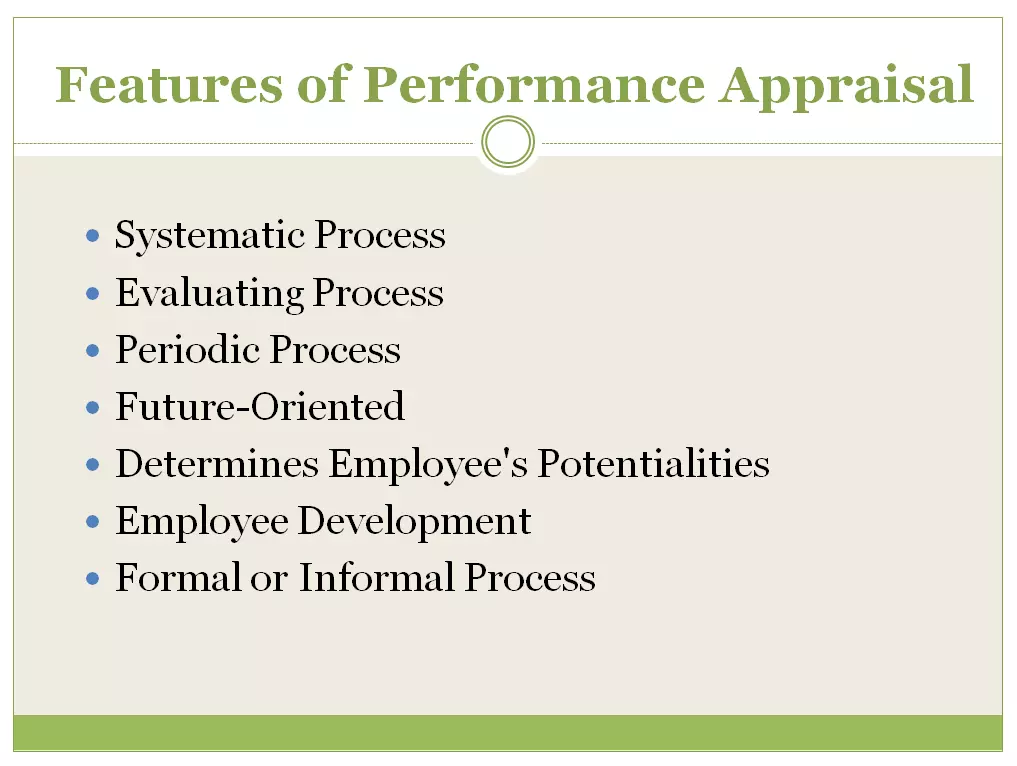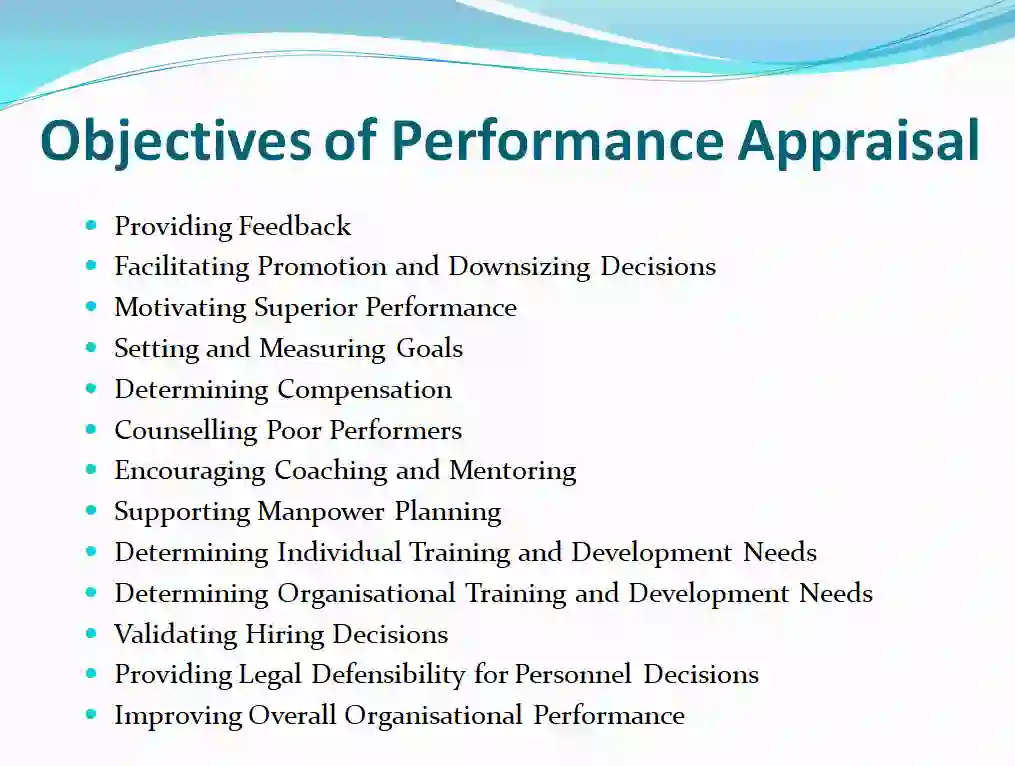Table of Contents:-
Meaning of Performance Appraisal
Performance appraisal is one method used for evaluating the behaviour of employees in the workplace. It generally includes both the quantitative and qualitative aspects of job performance.
Performance refers to the extent of accomplishment of the tasks that make up an individual’s job. It indicates how well an employee is fulfilling the job demands. Performance is always evaluated based on results.
For example, a student may put in a great deal of effort while preparing for the examination but may end up receiving a poor grade. In this case, the effort expended is high but performance is low, Job performance can be observed by immediate supervisor, subordinates, self-appraisal, customers served, and computers.
Definition of Performance Appraisal
According to Mondy et al., “Performance appraisal is a system of review and evaluation of an individual’s (or team’s) performance”.
According to Gomej-Mejia et al., “Performance appraisal involves the identification, measurement, and management of human performance in organisations”.
As per DeNisi, “Performance appraisal is the system whereby an organisation assigns some score to indicate the level of performance of a target person or group”.
According to Flippo, “Performance appraisal is defined as a systematic, periodic and so far as humanly possible, an impartial rating of an employee’s excellence in matters about his present job and his potentialities for a better job”.
Performance Appraisal Meaning
Performance appraisal is the process of identifying analysing, and recording the information related to the performance of employees. The performance appraisal method is used for measuring and improving the actual performance and future potential of employees. The objective of this method is to measure the work performance of employees and find the areas in which employees have superior performance and where they need improvement.
Features of Performance Appraisal
Features of performance appraisal are as follows:
1) Systematic Process: The appraisal is a systematic process that involves three steps.
i) Setting work standards.
ii) Assessing employee’s actual performance relative to work standards.
iii) Providing feedback to the employees so that they can eliminate deficiencies and improve performance over time.
2) Evaluating Process: It tries to find out how well the employee performs the job and establishes a plan for further improvement.
3) Periodic Process: The appraisal is conducted periodically according to a definite schedule. It is not a one-shot deal.
4) Future-Oriented: Performance appraisal is not a past-oriented activity to put poor performers in a spot. Rather, it is a future-oriented activity that guides employees in identifying where things have gone wrong, how to set everything in order and deliver results properly using their potential.
5) Determines Employee’s Potentialities: Performance appraisal refers to how well an employee does the assigned job.
6) Employee Development: Performance appraisal is not limited to identifying fouls. Its focus is on employee development. It compels managers to become coaches rather than judges. The appraisal process provides an opportunity to eliminate any potential problems, identify issues for discussion, and set new goals for achieving high performance.
7) Formal or Informal Process: The informal evaluation is more likely to be subjective and influenced by personal factors. Some employees are liked better than others and for that reason alone, they have better chances of receiving various kinds of rewards than others. The formal system is likely to be more fair and objective since it is carried out systematically, using printed appraisal forms.

Objectives of Performance Appraisal
Objectives of performance appraisal are as follows:
1) Providing Feedback
Providing feedback is the most common rationale for an organisation to have a performance appraisal system. Through the performance appraisal process, the individual learns exactly how well he did during the previous twelve months and can then use that information to improve his performance in the future. In this regard, performance appraisal serves another important purpose by ensuring that the boss’s expectations are effectively communicated.
2) Facilitating Promotion and Downsizing Decisions
Performance appraisal makes it easier for the organisation to make good decisions about promotion and downsizing to make sure that the most talented individuals are retained and the organisation’s marginal performers are cut loose.
3) Setting and Measuring Goals
Goal-setting has always been demonstrated as a management process that generates exceptional performance results. The performance appraisal process is commonly used to ensure that each member of the organisation sets and achieves effective goals.
4) Motivating Superior Performance
Performance appraisal helps in motivating people to deliver superior performance in many ways. The performance appraisal process helps them learn just what it is that the organisation considers to be “superior.” Since most people want to be seen as superior performers, a process of performance appraisal provides them with a means to demonstrate that they are. It enables employees to avoid being stigmatised as inferior performers (or, often worse, as merely “average”).
5) Determining Compensation
Almost every organisation believes in pay for performance. Performance appraisal provides the mechanism to ensure that those who do better work are rewarded with appropriate compensation.
6) Counselling Poor Performers
Not everyone meets the organisation’s standards. Performance appraisal compels managers to address those whose performance is not meeting the company’s expectations.
7) Supporting Manpower Planning
Well-managed organizations regularly assess their bench strength to ensure that they have the talent in their ranks that they will need for the future. Businesses need to determine who and where their most talented members are.
They need to identify the departments that are rich with talent and the ones that are facing a talent shortage. Performance appraisal gives companies the they need to make sure they have the intellectual horsepower required for the future.
8) Encouraging Coaching and Mentoring
Managers are expected to be good trainers to their team members and mentors to their proteges. Performance, appraisal identifies the areas where training is required and encourages managers to take an active coaching role.
9) Determining Individual Training and Development Needs
If the performance appraisal procedure includes a requirement for determining and discussing individual development plans, individuals can then make informed decisions about the skills and competencies they need to acquire to make a greater contribution to the company. As a result, they increase their chances of promotion and reduce their odds of layoff.
10) Determining Organisational Training and Development Needs
Would the organisation be better off sending all of its professionals and managers through a customer service training programme or one on effective decision-making?
By reviewing the data from performance appraisals, training and development professionals can make good decisions about where the organisation should focus company-wide training efforts.
11) Validating Hiring Decisions
Is the organisation employing stars, or is it filling itself with trolls? Only when the performance of newly employed individuals is assessed, can the company learn whether it is hiring the right individuals.
12) Providing Legal Defensibility for Personnel Decisions
Almost any personnel decision – termination, denial of promotion and transfer to another department be subjected to legal scrutiny. If one of these is challenged, the company must be able to demonstrate that the decision it made was not based on the individual’s race, handicap, or any other protected aspect. A solid record of performance appraisals significantly enhances legal defensibility when facing a discrimination complaint.
13) Improving Overall Organisational Performance
This is the most important reason for an organisation to have a performance appraisal system. A performance appraisal procedure enables the organization to communicate performance expectations to every member of the team and assess precisely how well each person is performing.
When everyone is clear on the expectations and knows precisely how they are performing against them, this will result in an overall improvement in organizational success.

